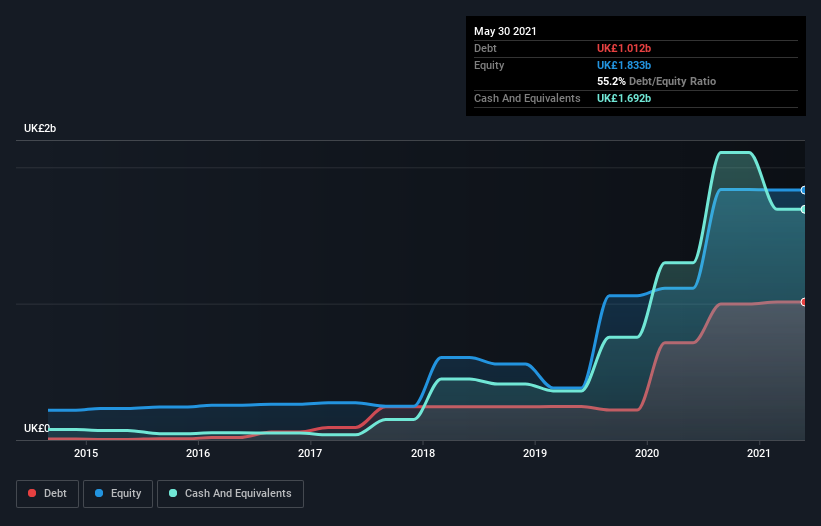
Warren Buffett famously said, 'Volatility is far from synonymous with risk.' So it might be obvious that you need to consider debt, when you think about how risky any given stock is, because too much debt can sink a company. As with many other companies Ocado Group plc (LON:OCDO) makes use of debt. But should shareholders be worried about its use of debt?
What Risk Does Debt Bring?
Debt assists a business until the business has trouble paying it off, either with new capital or with free cash flow. Part and parcel of capitalism is the process of 'creative destruction' where failed businesses are mercilessly liquidated by their bankers. However, a more common (but still painful) scenario is that it has to raise new equity capital at a low price, thus permanently diluting shareholders. Of course, plenty of companies use debt to fund growth, without any negative consequences. When we think about a company's use of debt, we first look at cash and debt together.
See our latest analysis for Ocado Group
What Is Ocado Group's Net Debt?
As you can see below, at the end of May 2021, Ocado Group had UK£1.01b of debt, up from UK£713.4m a year ago. Click the image for more detail. But on the other hand it also has UK£1.69b in cash, leading to a UK£679.8m net cash position.

How Healthy Is Ocado Group's Balance Sheet?
Zooming in on the latest balance sheet data, we can see that Ocado Group had liabilities of UK£501.3m due within 12 months and liabilities of UK£1.81b due beyond that. On the other hand, it had cash of UK£1.69b and UK£237.7m worth of receivables due within a year. So its liabilities outweigh the sum of its cash and (near-term) receivables by UK£385.3m.
Given Ocado Group has a humongous market capitalization of UK£14.7b, it's hard to believe these liabilities pose much threat. But there are sufficient liabilities that we would certainly recommend shareholders continue to monitor the balance sheet, going forward. While it does have liabilities worth noting, Ocado Group also has more cash than debt, so we're pretty confident it can manage its debt safely. When analysing debt levels, the balance sheet is the obvious place to start. But it is future earnings, more than anything, that will determine Ocado Group's ability to maintain a healthy balance sheet going forward. So if you want to see what the professionals think, you might find this free report on analyst profit forecasts to be interesting.
Over 12 months, Ocado Group reported revenue of UK£2.6b, which is a gain of 31%, although it did not report any earnings before interest and tax. With any luck the company will be able to grow its way to profitability.
So How Risky Is Ocado Group?
We have no doubt that loss making companies are, in general, riskier than profitable ones. And we do note that Ocado Group had an earnings before interest and tax (EBIT) loss, over the last year. And over the same period it saw negative free cash outflow of UK£404m and booked a UK£146m accounting loss. While this does make the company a bit risky, it's important to remember it has net cash of UK£679.8m. That means it could keep spending at its current rate for more than two years. With very solid revenue growth in the last year, Ocado Group may be on a path to profitability. Pre-profit companies are often risky, but they can also offer great rewards. The balance sheet is clearly the area to focus on when you are analysing debt. But ultimately, every company can contain risks that exist outside of the balance sheet. For example, we've discovered 1 warning sign for Ocado Group that you should be aware of before investing here.
If, after all that, you're more interested in a fast growing company with a rock-solid balance sheet, then check out our list of net cash growth stocks without delay.
If you’re looking to trade Ocado Group, open an account with the lowest-cost* platform trusted by professionals, Interactive Brokers. Their clients from over 200 countries and territories trade stocks, options, futures, forex, bonds and funds worldwide from a single integrated account. Promoted
New: AI Stock Screener & Alerts
Our new AI Stock Screener scans the market every day to uncover opportunities.
• Dividend Powerhouses (3%+ Yield)
• Undervalued Small Caps with Insider Buying
• High growth Tech and AI Companies
Or build your own from over 50 metrics.
This article by Simply Wall St is general in nature. We provide commentary based on historical data and analyst forecasts only using an unbiased methodology and our articles are not intended to be financial advice. It does not constitute a recommendation to buy or sell any stock, and does not take account of your objectives, or your financial situation. We aim to bring you long-term focused analysis driven by fundamental data. Note that our analysis may not factor in the latest price-sensitive company announcements or qualitative material. Simply Wall St has no position in any stocks mentioned.
*Interactive Brokers Rated Lowest Cost Broker by StockBrokers.com Annual Online Review 2020
Have feedback on this article? Concerned about the content? Get in touch with us directly. Alternatively, email editorial-team (at) simplywallst.com.
About LSE:OCDO
Ocado Group
Operates as an online grocery retailer in the United Kingdom and internationally.
Limited growth with imperfect balance sheet.
Similar Companies
Market Insights
Community Narratives



